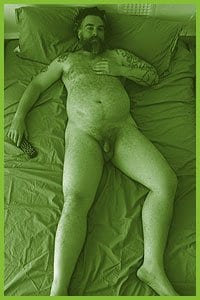A Toronto imaging company has refused to print artist AA Bronson’s latest work, saying it offends several employees who work at the company and borders on pornography.
As well, Jones And Morris Photo Digital Imaging is refusing to reprint images from Bronson’s Hanged Man series of photos – even though the company published the originals. An image from that series has been published in the National Post. Three photos from the current set have been printed in the Canadian art journal BorderCrossings.
Bronson has been working with the company for two years and didn’t anticipate any problems with his latest work, Nest. Each photo in the series features a gay man naked in his own bed in his own home.
“If he has a partner, I photograph the two of them together. The men are not idealized and there is no sexual content,” says Bronson. “I think they’re tender photos, there’s nothing pornographic.”
Dan Morris, co-owner of the company, says he works primarily in the office and doesn’t see most of the photographs the company prints. In this case, he happened to hear a comment from one of his female employees who was taken aback by the images.
“Those particular photos were found offensive by female employees,” says Morris. ” I looked at it and said, ‘She’s absolutely right.'”
Bronson says he feels he’s been treated unfairly, especially since the company never told him it had a policy around nudes. The only difference between the Nest series and previous series that the company had printed is that some of the photos contain two men.
“I think that two men in bed together is the problem. It’s not really anything to do with porno-graphy or sex, it’s intimacy between two men that is the problem,” he says.
Morris says that his employees don’t get to choose what the company will or will not print, but if something is brought to his attention as offensive and he agrees with them, he has the right to turn down the job.
“If they’re offended by it, I have to keep tranquillity within my building. One client to me is not worth upsetting my staff,” says Morris. “There were two comments made by two different female employees and I said, ‘If this is offending my staff, it’s not going to be in this building.'”
Bronson says the two employees in question work in the office and don’t have a reason to be viewing the photographs. Morris suggested to Bronson that in the future he bring in jobs one by one and they’ll look at them and decide whether or not they can print them.
“I guess that means they’re going to show them to everyone on the staff and see if anybody has a problem and basically everybody on the staff has veto power over my work,” says Bronson, who wonders if they’d veto a company like Marlboro as a client because an employee objects to smoking.
He says a lawyer advised him it would be possible to take legal action against the company. He admits he’s not likely to pursue it.
“I’m never going to work with them again anyway, so I’d really just rather that people know – my first priority is that people realize it’s a homophobic place.”

 Why you can trust Xtra
Why you can trust Xtra


